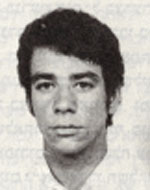Ben-Shabbat, Yosef
Yosef was born on September 28, 1949, in Casablanca, Morocco, where he studied at the Alliance school in his hometown, and in the 1960s immigrated to Israel with his family, who settled in Netanya. When the family arrived in Israel, Yosef took upon himself to establish the family in its new place, and soon overcame the difficulties of absorption and the transition from one country to another. Helped his father get absorbed in the work, and because of his great concern for the family, his younger brothers and sisters could go to schools in Israel and acquire knowledge and education. His father, who was adopted as a construction worker, was affected by pneumonia and his illness caused him to leave his job and move to work in the diamond industry, where he worked during the day and worked in the evening to increase his salary. He was trained as a gunner and a member of the staff with a moving cannon, and because he was a new immigrant, he was placed in reserve duty immediately after completing basic training. In his reserves unit in the Artillery Corps, he was called for periods of reserve service. During the Yom Kippur War, his unit participated in the battles of containment and infiltration against the Egyptians in the Sinai. His battalion was one of the first to cross the Suez Canal. Joseph fell on the 19th of Tishrei 5734 (19.10.1973), an enemy bombardment of our forces at the airport of De-Soir, west of the Suez Canal. He was brought to eternal rest in the cemetery in Netanya. Survived by his parents, six brothers and five sisters. After his fall, he was promoted to corporal. In his fall, his family lost his main livelihood and the source of his visa. In a letter of condolence to the bereaved family, his commander wrote: “We overcame the Arab armies, but in order to achieve this, and in order to prevent a holocaust and destruction, many good people fell – and with great pain we can say – too many and the best. And took part in the various stages of the containment, conquest and occupation of the West Bank of the Suez Canal, seven of our soldiers were killed and many others were wounded, and the most precious of them was brought to us. And when, after the night of the fighting, the enemy’s artillery began a bitter attempt to stop our forces . It is very difficult for me to write this letter, and especially after I know that there is no consolation for the loss of your loved one who fell. I will not try to praise and praise the letter, for the words sound hollow when they are written down. But I want you to know that you are not alone in your great mourning and that the commanders and soldiers of the unit share with you our deep sorrow over the death of a friend and a member of the armed forces. “
